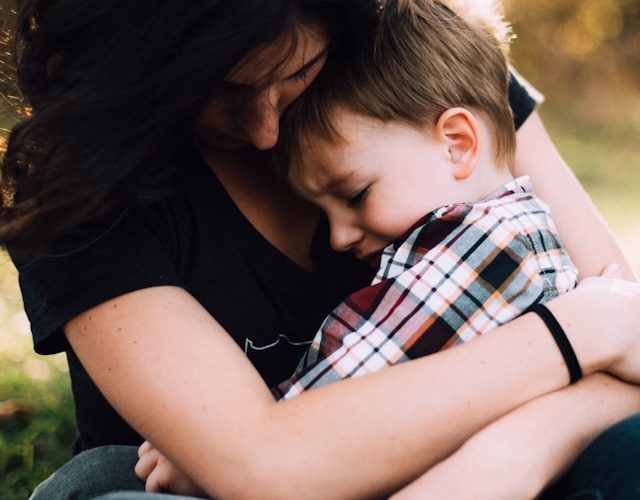First posted to: https://surehopecounseling.com/let-the-little-children-come-childhood-lament/

Have you ever been taken aback by a child’s brutal honesty? Perhaps a comment about your wrinkles or the way you smell, or even a wiser observation about your mood or way of being. I think of this often as I remember all of the play therapy clients that I have worked with, but also in observing my own children and considering my responsibilities in teaching them about Jesus and the world. One of the things that often gets forgotten in parenting is the idea that we must teach our children how to lament.
Let’s start with Matthew 19:14 as a framework for our post today:
“Jesus said, “Let the children come to me and do not hinder them, for to such belongs the kingdom of heaven.” (ESV)
A simple sentence, so full of wisdom and compassion and direction from Jesus. And while this verse does not specifically relate to childhood lament, it is helpful to see Jesus’ approach to children.
The scriptures are clear about the way God values children; that they are formed and treasured in the womb (Psalm 139), that they are a blessing and reward (Psalm 127:3-5), that they are a source of joy (Matthew 18:10), and more. When Jesus tells the disciples to allow the children to come to him, he is communicating multiple ideas:
- (Let the children come to me) The children are welcomed and desired in the presence of Jesus;
- (Do not hinder them) Adults need not see children as an inconvenience, annoyance, or distraction (quite the opposite as we will see);
- (For to such belongs the kingdom of heaven) That the authenticity, curiosity, and purity of children should be an example of the heart stance that Jesus desires for all of us to have.
Teaching Your Child to Lament in Light of Matthew 19:14
I mentioned before that there is an often-overlooked aspect of parenting that is actually critical to consider. The reality is, that childhood grief is not rare. The Childhood Bereavement Estimation Model and report estimates that 6.3 million children in the United States will experience a death of a parent or sibling by age 18. This, of course, excludes other forms of grief and loss, including deaths of grandparents and other relatives, significant life changes such as relocating and loss of community, losses of pets, etc. Teaching them to grieve in a godly way can protect against significant mental health issues, relationship strain, and other challenges that come from losses. So following our 3 points from Matthew 18:10, let’s look at practical ways to teach your child to grieve.
- (Let the children come to me) Make sure your child knows that the Lord desires for them to lament in his presence. Consider having a physical representation of grief to help them externalize some of their emotions. Teach them
- Psalm 56:8 – “You keep track of all my sorrows. You have collected all my tears in your bottle. You have recorded each one in your book.” Create a bottle in which a child can hold while praying or deposit prayers into. The prayers can be as simple as “I’m sad today” or “please notice my tears.”
- Psalm 34:18 – “The Lord is close to the brokenhearted and saves those who are crushed in spirit.” This helps tell children the truth that the Lord is near to them in their grief, even if it is not immediately felt. Have your child draw a representation of this verse.
- (Do not hinder them) Children need adults to “hold space” for their children and for children to believe that their emotions matter. A true lament, as we see in scripture, is often raw, deeply emotional, and can be lengthy. In order for a child to avoid getting stuck in emotions indefinitely, they need to be able to express them authentically with a safe present person. This is where those surprising comments and emotions may come into play. I encourage you not to hinder your child from expressing their sadness, but do not forget to point them to Jesus’ presence and hope after some time so that their emotions do not become paramount to gospel truth.
- (For to such belongs the kingdom of heaven) Honor the childlike faith that your children have to be authentic in their processing of their emotions. Honor even their difficult questions, doubts, and fears. God can handle their questions with compassion and care and is never afraid of the emotions that he created. Teach them that they do not have to hide their feelings from God and that He honors their grief and questions and wants to be their first source of comfort (for now, that may be through you as a parent).
A few notes on childhood grief:
- Children will often delay their grief until an adult has processed and begun some level of healing. This is common and can look like a child is not experiencing grief in an “expected” way.
- As children grow up, they may get “fresh batches” of grief. Of course, adults experience this as well, but it may be heightened or look like a brand new way of grieving as children grow and their brains develop at different levels of understanding and emotional maturity.
- Children grieve differently than adults; it often shows up in the form of behaviors rather than expression of emotion. This can look like tantrums, being easily distracted, anger/rage, destroying property, etc.
I’m thankful for a God who cares how we feel and values the needs of the littlest of us. If you need help walking your child through grief and lament, find our therapists here and stay tuned for future virtual seminars that can help.
-Mary Shea – learn more about Mary’s seminars and presentations here!
You can also read about how to help your teenager lament here!



